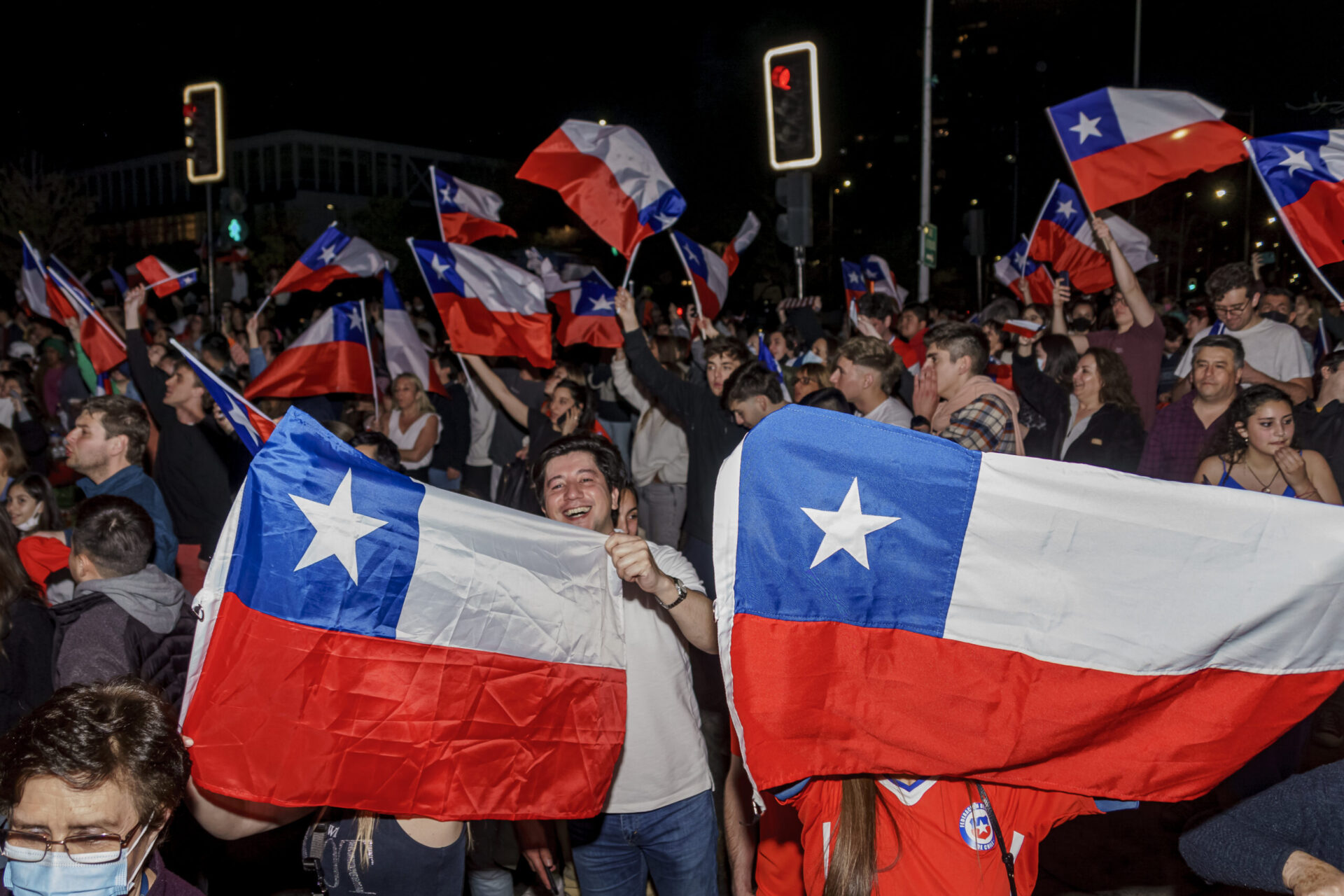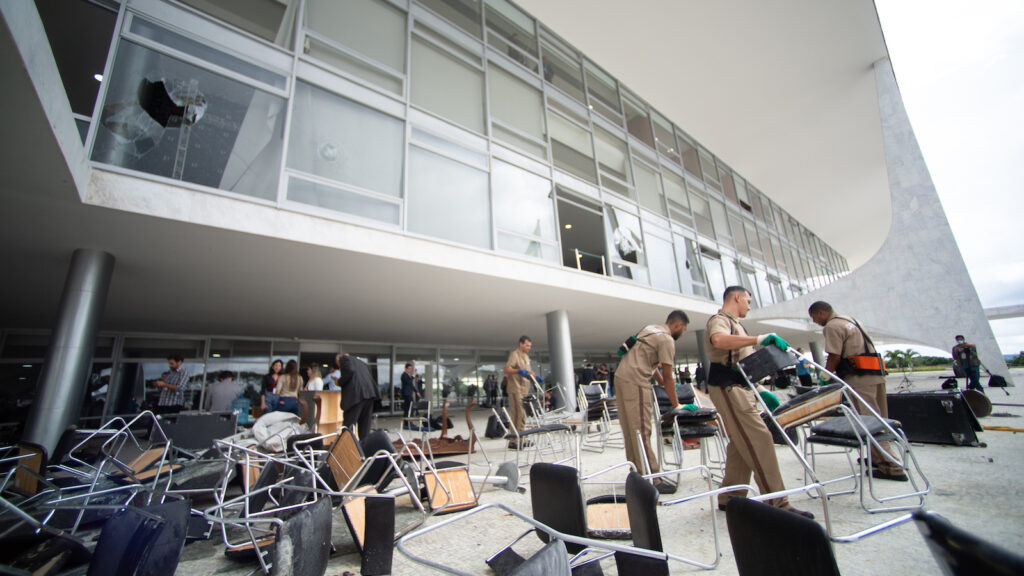Can the Political Center Return in Chile?

Demonstrators against a new constitution celebrate after the results of the referendum to approve or reject the current constitution imposed during the dictatorship of Augusto Pinochet on September 4, 2022 in Santiago, Chile.
Photo: Sebastián Vivallo Oñate/Agencia Makro/Getty Images
Chileans of all walks of life had clamored for years for a new constitution, yet last month, voters changed their minds and took a 180-degree turn, rejecting the new document. The overwhelming rejection vote of 62% sent shock waves through the entire hemisphere. It is important to understand what occurred to change the mind of Chilean voters, for it generates hope for a revived political center in Latin America.
Just a couple of years ago, massive national street protests rocked this previously peaceful and prosperous South American haven. Protestors called for a new constitution, and with good reason — the prevailing constitution dated back to General Augusto Pinochet and the dark days of human rights abuses and restrictions on liberties. A massive vote to create a new constitution ensued, leading to a constitutional convention charged with writing a Magna Carta for the country. The convention opened its doors just as the campaign to elect a new president heated up, and Chile chose Gabriel Boric, a young, new, left-of-center president. Change was in the air. It was palpable.
A Grab Bag of Demands
To understand the rejection of the draft constitution, it is essential to review the process that led to its drafting. How did a referendum vote, in which a massive 78% of the people approve the writing of a new constitution, engender a second vote for a constitutional assembly that had a very low voter turnout of 43%?
This second vote resulted in an assembly with members that had little political experience and a sharp ideological tilt to the left. While the constitution had some admirable goals, it became a plethora of new demands and rights.
Among the new rights: a right to a minimum of electric power, the right to sport and physical activity, and the right to leisure, rest and enjoyment of free time. Indigenous tribes and geographies were also given vaguely defined independent rights, leading to the accusation that the constitution would dismember the country.
The document expanded government power exponentially and divided, instead of uniting, the overwhelming number of Chileans who supported banishing the Pinochet era’s current constitution. President Boric, a leader who came into prominence during the street protests that shook the country, was unable to exercise control over the constituent assembly members.
Where Does Chile Go from Here?
Clearly, the people spoke loud and clear in two ways: to support a new constitution and to reject the draft of the new one. Ignoring those resounding votes would be a mistake for any politician on the right or the left. As Chilean polling company lead Marta Lagos put it: “What do Chileans want? We know what they don’t want, they don’t want this new proposed constitution.” … “We’re now searching for what they do want.”
Chile is fortunate to have a young but nimble leader in President Boric. He had supported the “approve” campaign for the new constitution and, while the rejection of the constitution was a rebuke for Chile’s new leader, President Boric smartly did not allow the lopsided rejection to increase polarization. Indeed, he recognized the need for “a constitution that unites the country.”
President Boric has so far represented a modern center-left leader who has resisted attempts to take him to the extremes.
Chile now faces several new challenges. A new constitution needs to be drafted — remember 78% of the population voted for writing a new constitution. Secondly, the process must gather some speed. The constitutional assembly’s anti-private sector, anti-foreign investment and anti-capital repatriation rhetoric caused Chile to lose precious growth opportunities at a time of global economic difficulties.
A New Constitution Needs to Be Drafted
This next draft document will be “owned” by the president. It’s his to shape and bring to life — and he’s now got some space to negotiate. This will require negotiations and deals with politicians that his core electorate abhors. President Boric will be walking a political tightrope that both clings to his socially engaged roots while nudging his government’s policies toward the center.
President Boric has promised to continue the path toward a new constitution, but in doing so, seek to find consensus with the traditional political powers that were largely shunned in the constituent assembly process. For an agreement to actually happen, the extremes have to be willing to negotiate. President Boric’s coalition is a vast ideological spectrum of center parties to communists. He must unify the center-right and the far-left behind an effort to produce a working national document.
A New Space for Negotiation
This means working with the Chilean congress to chart a path forward. Recognizing the new political reality he faces, President Boric also shook up his presidential cabinet, removing more ideological minded ministers, in favor of older, more traditional center-left individuals. The fervor of the 2019 protests was the key to his electoral success. But the utopian zeal and street fury of the protests are not the ingredients needed for a successful government. President Boric has shown he knows this.
While a small country, much continues to ride on Chile as a positive model for political moderation and positive change in the region. President Boric has so far represented a modern center-left leader who has resisted attempts to take him to the extremes. The electorate’s radical verdict on the constitution affords President Boric a new space for negotiation and success. What he does with this new political space will be carefully watched by leaders in the region.







